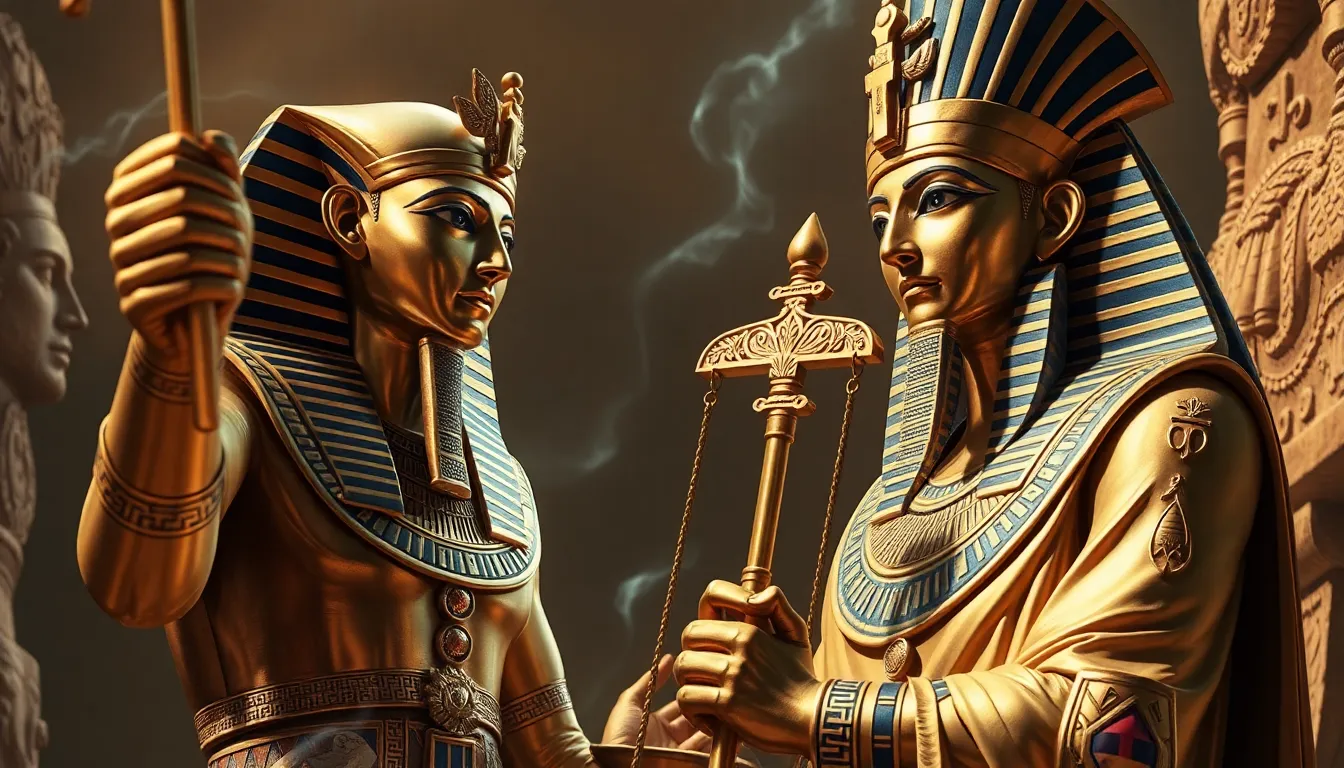The Pharaoh’s Divine Role in Justice and Law
I. Introduction
The Pharaoh of Ancient Egypt held a pivotal position in the social and political hierarchy of the civilization. As the highest authority, the Pharaoh was not only a ruler but also a symbol of divine power and order. Justice and law were fundamental components of Ancient Egyptian society, essential for maintaining harmony and stability among the populace.
In this context, the Pharaoh acted as a divine intermediary, embodying the principles of justice and law that governed the land. This article explores the multifaceted role of the Pharaoh in the judicial system of Ancient Egypt, delving into historical contexts, religious beliefs, and the lasting legacy of their judicial practices.
II. Historical Context of the Pharaoh’s Power
The role of the Pharaoh evolved significantly from the early dynasties to the New Kingdom. Initially, the Pharaoh was viewed primarily as a warrior king; however, over time, their functions expanded to encompass religious and judicial responsibilities.
- Theocratic Governance: The intertwining of religion and politics established the Pharaoh as a central figure in both spheres, where their decrees were seen as divine will.
- Living God: The Pharaoh was considered a living god, which had profound implications for their authority over law and justice. Their decisions were viewed as infallible, linking the administration of justice to divine order.
III. The Concept of Ma’at in Ancient Egypt
At the heart of Ancient Egyptian law and justice was the concept of Ma’at. Ma’at represented truth, balance, order, and cosmic harmony, serving as a guiding principle for the Pharaoh’s rule.
- Definition: Ma’at was not only a concept but also personified as a goddess, symbolizing the universal order.
- Pharaoh’s Duty: The Pharaoh was responsible for upholding Ma’at, ensuring that laws were just and equitable.
- Influence on Legal Practices: Legal judgments were made in accordance with Ma’at, reflecting the values of truth and fairness.
IV. The Pharaoh as the Supreme Judge
The Pharaoh’s authority extended to the legal realm, where they acted as the supreme judge in disputes and criminal cases.
- Legal Authority: The Pharaoh had the ultimate power to adjudicate and enforce laws, often presiding over significant legal cases.
- Trial Process: Legal proceedings were conducted in a manner that sought to reflect the principles of Ma’at, often involving a panel of judges and witnesses.
- Notable Pharaohs: Historical records showcase several Pharaohs renowned for their legal rulings, such as Pharaoh Hatshepsut, who is noted for her fair judgments.
V. The Role of the Vizier and Other Officials
While the Pharaoh held supreme authority, much of the judicial workload was delegated to the vizier and other officials who assisted in the administration of justice.
- Delegation of Responsibilities: The vizier acted as the Pharaoh’s chief advisor and was responsible for overseeing legal matters.
- Judicial Advisors: The relationship between the Pharaoh and his judicial advisors was vital for effective governance, with the vizier playing a critical role in interpreting and enforcing laws.
- Local Officials: Local governors and magistrates were tasked with enforcing laws at the community level, ensuring that justice was administered in accordance with the Pharaoh’s edicts.
VI. Religious Rituals and Justice
Religion and justice were inseparable in Ancient Egypt, with religious rituals integrated into legal proceedings to emphasize the divine nature of the law.
- Religious Integration: Rituals were often conducted to invoke the favor of the gods before important legal decisions were made.
- Symbolism of Divine Status: The Pharaoh’s divine status lent authority to the judicial process, reinforcing the idea that justice was a manifestation of divine order.
- Divine Retribution: The belief in divine retribution influenced how laws were perceived and followed, as individuals sought to align their actions with the principles of Ma’at to avoid punishment.
VII. Legacy of the Pharaoh’s Judicial System
The judicial system established by the Pharaohs has left a lasting legacy that extends beyond Ancient Egypt.
- Influence on Later Civilizations: Ancient Egyptian law served as a foundation for legal systems in subsequent cultures, influencing governance and justice practices.
- Historical Perception: Texts and artifacts from Ancient Egypt reflect the high regard for the Pharaoh’s role in justice, often depicting them as wise and just rulers.
- Modern Relevance: The principles of Ma’at continue to resonate within modern legal systems, emphasizing the importance of truth and balance in governance.
VIII. Conclusion
In summary, the Pharaoh’s divine role in justice and law was integral to Ancient Egyptian society. The balance between power and morality in governance was reflected in their commitment to the principles of Ma’at, which sought to maintain order and harmony.
The enduring legacy of the Pharaohs in the context of justice and law serves as a testament to the intricate relationship between governance and morality, influencing legal thought and practices well into modern times.




